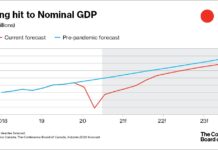CANADA’S unions say the federal government’s fiscal update will help the nation’s workers weather current health and economic hardships through the pandemic.
Monday’s update extends critical income support and economic measures to help Canadians and businesses. While these commitments on key priorities remain modest and reflect past promises, the government has signalled it will make further investments as the recovery begins to take shape.
“Canada’s workers and their families are staring down a harsh, frightening winter of economic uncertainty in the midst of a health crisis that shows no sign of letting up,” said Hassan Yussuff, President of the Canadian Labour Congress (CLC).
“They have received assurances that their government will help them make ends meet and safeguard their health and well-being. However, it’s clear that many essential investments will be required around critical priorities like child care, pharmacare and towards key industries to ensure a rapid recovery.”
The federal government made numerous commitments towards workers and their families, including:
- * The promise of improved working conditions and measures to support retention and recruitment of care economy workers and early childhood educators;
- * Creation of new national standards for long-term care and a $1 billion fund to improve the quality of care;
- * Green economy investments, including support for home energy efficiency retrofits and the goal of planting 2 billion trees;
- * Limited sector-specific support for the hospitality and aviation sectors;
- * Measures to tax the multinational digital giants and improve tax compliance;
- * The creation of a Federal Secretariat on Early Learning and Child Care; and,
- * The announcement of a task force on modernizing the Employment Equity Act.
Canada’s unions join other experts and stakeholders in emphasizing that the priority must remain on returning Canada to full employment rather than on reducing debt.
“Harsh cuts in the past have put Canadians more at risk today. We need only to look at the state of long-term care, the erosion of public health capacity and an insufficient Employment Insurance program,” said Yussuff. “This is why we have been calling on governments to disaster-proof the country to help us withstand future crises while we recover from this one.”
To read more about the directed investments the CLC is calling for, visit canadianplan.ca.













